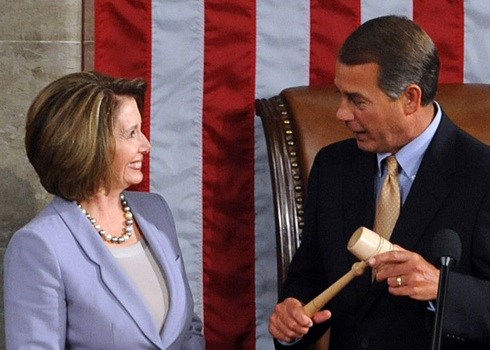Republicans were caught with their pants down Friday when Democrats pulled a fast one on the House floor. In the lead up to a vote on their controversial budget, Republicans nearly zapped it and replaced it with an even more conservative 10-year vision for the country — the right-wing Republican Study Committee’s budget alternative.
To recap, Democrats took a flyer.
They waited until the last minute, and then voted “present” on the RSC plan. That put the question of whether to swap out Paul Ryan’s plan for the RSC’s in GOP hands. At the last moment, Republicans realized that a majority of their party had voted for the farther-reaching budget and had to whip votes backwards to prevent it from passing accidentally. It was quite a scene.
But what exactly were they voting on? What does a majority of the House Republican caucus secretly want to do that the budget they ultimately passed doesn’t accomplish?
The RSC budget is like Paul Ryan’s budget on steroids. Both proceed from the assumption that the government should freeze or reduce revenue, should lower taxes on the wealthy, and should dramatically cut entitlement programs. The RSC plan just does more of it.
The biggest single difference? Unlike Ryan’s plan, the RSC budget goes after Social Security — it quickly phases in a higher retirement for everybody under 60 years old today. For those born in 1952 or later, it would raise retirement age to 66 years and 2 months immediately. After that the eligibility age would increase two months a year for several years until it hits 70 years of age for everybody born in 1975 or after.
Like the Republicans’ official budget, the RSC plan phases out Medicare and turns it into a voucher program for private insurers. It just does it faster. The GOP budget begins the transition in 10 years, leaving the program in tact for people 55 and over — current beneficiaries, and people who will be beneficiaries within a decade. The RSC plan achieves the phase out in five years, impacting Americans under 60 years old. It also increases their eligibility age from 65 to 67.
Both plans turn Medicaid into a block grant program, but the RSC caps the federal commitment at 2006 levels.
Both plans likewise turn food stamps into a block grant program, and limit eligibility. But the RSC plan caps the plan at 2007 levels. The GOP-passed plan institutes the cap in 2015.
The RSC plan ends federally subsidized student loans for graduate students, and cuts the Pell Grant program by eliminating the add-on that automatically increases the maximum grant size year by year. It sells off the Tennessee Valley Authority electric utility to the private sector. It arbitrarily eliminates 15 percent of the federal workforce, and re-indexes federal retirees’ pension payments at a lower rate of inflation. It repeals the 2009 expansion of SCHIP which benefitted millions of children — or, as the RSC puts it, drove them “from the private market to government care” — by taxing cigarette companies, and hands the money over to states with minimal requirements. And it recommends budget process reforms that would make it nearly impossible to ever raise taxes again.
All told, it amounts to $9 trillion in spending cuts over the course of 10 years. Oh yeah. And it nearly passed.






